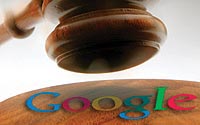
Google potentially confuses consumers by allowing companies' trademarked names to trigger competitors' pay-per-click
ads, an appellate court ruled on Monday.
In a 47-page decision, the 4th Circuit Court of Appeals ruled that Rosetta Stone presented enough evidence to justify a trial about whether consumers
were confused by AdWords ads. The pay-per-click ads -- for companies other than Rosetta Stone, including sellers of counterfeits -- were displayed to users who typed "Rosetta Stone" into Google's
query box.
"We conclude that a reasonable trier of fact could find that Google intended to cause confusion in that it acted with the knowledge that confusion was very likely to result from its
use of the marks," the appeals court wrote. The ruling reversed U.S. District Court Judge Gerald Bruce Lee's 2010 decision dismissing Rosetta Stone's trademark infringement lawsuit.
The case
dates to 2009, when Rosetta Stone alleged in a complaint filed in Alexandria, Va.
that Google's AdWords policies gave competitors a free ride on Rosetta Stone's trademarked name. Rosetta Stone also alleged that its trademark was being used by counterfeiters, who duped consumers
into purchasing bogus software.
Rosetta Stone presented depositions of five consumers who said they were tricked into purchasing counterfeits after conducting Google searches for Rosetta
Stone. The language learning company also presented surveys showing that a significant percentage of users who search for "rosetta stone" are served ads for competitors" and "are likely to be confused
as to the affiliation, endorsement, or association" of those ads.
Google's own in-house surveys also showed some confusion when trademarked terms were included in the body of pay-per-click
ads, according to the appellate opinion.
Lee discounted the anecdotes and surveys, but the 4th Circuit said that evidence created "a question of fact as to consumer sophistication that cannot
be resolved on summary judgment."
Google could still prevail when the case returns to district court, but the decision to order a trial will "almost certainly" encourage other marketers to
take on Google, says Santa Clara University law professor Eric Goldman. "This opinion likely dooms Google to spending millions of dollars more to defend its practices."
Legal questions
surrounding keyword advertising will continue. "This ruling probably pushes back the date when keyword advertising sales are legal and acceptable in the United States by five to 10 years," Goldman
says.
A Google spokesperson says its policy of allowing a company's trademark to trigger ads for competitors is consumer-friendly. "Users
searching on Google benefit from being able to choose from a variety of competing advertisers. We think that the legitimate use of trademarks as keyword triggers helps consumers to make more informed
choices," the company said in a statement. Google added that it is "confident" it will ultimately prevail.